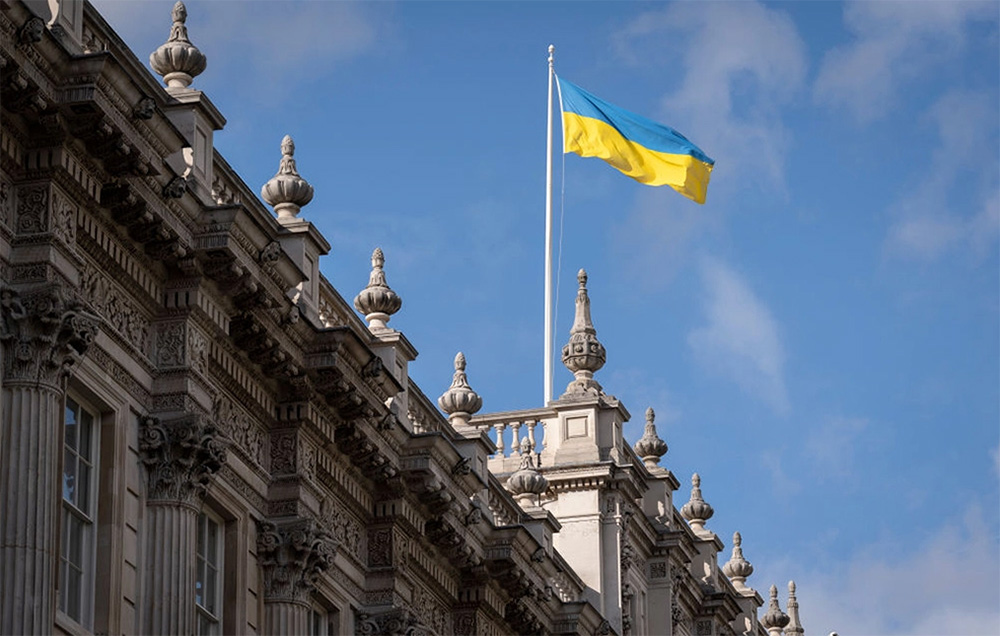If you walk down Whitehall, you will see numerous Ukrainian flags on government buildings. I approve the sentiments. Like many all over the country, we fly the Ukrainian flag in our garden. But is it right that the flag should be flown by HMG? On what basis, and by whom, is such a decision made? Just now, of course, the interests of the United Kingdom and of Ukraine are closely allied; but it is a basic principle of foreign policy that British interests may sometimes clash even with those of close allies. Suppose we fall out with Ukraine while the war continues. Would we keep the flags flying, thus looking hypocritical, or take them down, thus looking disloyal? If the state wishes to make a public gesture of support, surely it is better as a one-off, as when they played ‘The Star-Spangled Banner’ at the Queen’s request, when changing the guard just after 11 September 2001. The propaganda use of flags by officialdom is generally bad news. Until Gordon Brown decided to wear his patriotism on the nation’s sleeve by insisting on festooning our public buildings, even the Union flag was not regularly flying from most of them. Some of us took quiet pride in that restraint. Since then, public flaggery has spread further. The rainbow colours are just as likely to fly from a building like the Treasury or the MI6 HQ as are our national colours. This is objectionable because the rainbow, in that context, is not politically neutral. It represents a political idea which many do not share – that a successful polity should be a coalition of identity groups (usually arrayed on the left) rather than the common property of all citizens, regardless of race, religion, sexuality etc. If public officials can, as some do, wear rainbow lanyards, why can they not wear ones that say, for example, ‘Get Brexit done’? Let the lanyards, and the flags, bear no message whatever, except, if need be, that they are British.
The Nudge Unit (the Behavioural Insights Team) have just published a report, ‘How to Build a Net-Zero Society’. It is intended as ‘a guide for business and policy-makers’ and amounts to an encapsulation of when nudge comes to shove (answer: a coercive combination of stricter regulation and incentive by subsidy and pricing). As such, it is rather objectionable, but one should note the points the report feels its high-end business and policy-making customers need to understand. Speaking of electric vehicles (EVs), it admits they ‘don’t (yet) represent a good option for the majority of drivers who have less disposable income, only buy used cars, only have access to a single vehicle (which must therefore meet all their needs) and don’t have off-street parking to charge it overnight’. The nudgers clearly sense that most policymakers do not know that most car owners have only one car. This in turn implies that the great majority of green opinion-formers have two cars, one perhaps for reliability (petrol or diesel) and the other for virtue. Almost by green definition, a household with two cars, even EVs, is doing more to ‘wreck the planet’ than a one-car one. How about nudging these two-car elites down to one – and, while they’re at it, one house or, even better, one flat? Without such rigour, a nudge is a fudge.
Russell T. Davies, the famed TV screenwriter of Doctor Who etc, is firmly on the left. He once described the Conservatives as ‘bastards, abusers and liars’, but now he speaks with some passion about what is happening in his field. He is utterly fed up with people who come into television to ‘increase representation’: ‘They hate the media that ignores them, and they’re trapped into wanting a job in that medium purely to increase representation. I read their scripts and they’re rubbish. They don’t actually love television, so they don’t know how to write for it.’ I think this is the nub of the whole problem about wokery – National Trust staff stigmatising dead donors and houses because of slavery connections, Oxbridge Masters cancelling memorials to benefactors, directors ‘decolonising’ museums, art galleries and botanical gardens, HR departments imposing diversity and so on and on. It is not that their ideas are always wrong. It is right, for example, that the full role of slavery in the history of European powers be told. The problem is the motive. The common factor, identified by Russell T. Davies, is that the angry entrants to the field hate the institutions they join and therefore can only do their jobs in them disloyally and unprofessionally.
I am surprised it has not been more widely reported that the Pope swears in public. According to the Catholic Herald, in a recent off-the-cuff speech to seminarians in Barcelona, Francis used ‘foul language’. Describing priests who (in accordance with Canon Law) deny absolution to unrepentant people as ‘delinquents’, he criticised ‘f—ing careerists who f— up the lives of others’ and ‘those who climb to show their arses’. There is a paradox here. Francis, the peace-and-love advocate of toleration of more-or-less everything is quite a rude crosspatch. His conservative, ‘harsh’ predecessor, Benedict XVI, recently deceased, was the soul of courtesy and an absolute sweetie-pie.
Twitter has stricter views on inappropriate language than His Holiness. Until Elon Musk personally intervened, it locked out the British Trust for Ornithology for using the word ‘woodcock’. Odd that Twitter cannot distinguish the meaning of one word from two: might it think, on that principle, that ‘therapist’ meant ‘the rapist’? I do sympathise, however, if people called Woodcock find it irksome. John Woodcock, the brave anti-Corbyn Labour MP, was made a peer a couple of years ago. He abolished his name by adopting the title Lord Walney, although the practice of life peers taking new names was allegedly frowned upon by the late Queen. The person who assisted his transformation was the then Garter King of Arms, Thomas Woodcock.







Comments